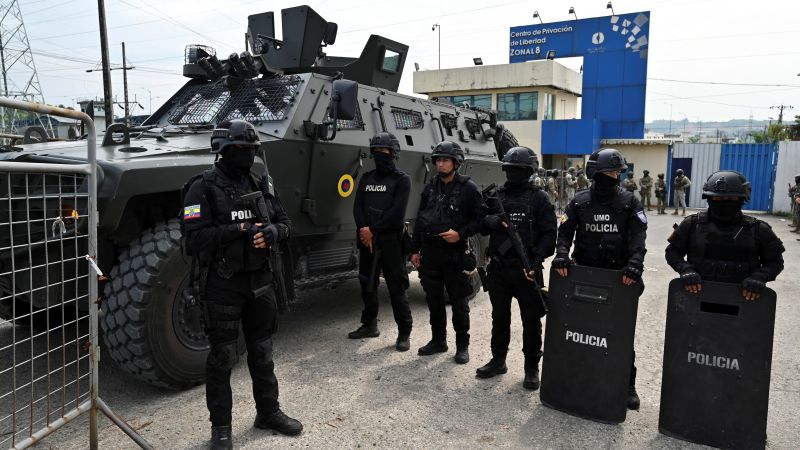CNN
—
Ecuador is facing outrage after storming the Mexican embassy in Quito to arrest controversial former Ecuadorian vice president Jorge Grasz, who had sought asylum in Quito.
Mexico announced on Monday that it would sue Ecuador at the International Court of Justice after Mexican President Andres Manuel López Obrador ordered an immediate suspension of diplomatic relations with Quito following Glass's arrest late Friday night. .
In a post on X, Obrador called the act “a clear violation of international law and Mexico's sovereignty.”
The breach of diplomatic protocol shocked the entire region, with Latin American leaders across the political spectrum condemning the incident.
Under diplomatic norms, embassies are considered protected spaces.
This marks the culmination of a series of diplomatic provocations between Mexico and Ecuador this week.
Ecuadorian authorities said Glass, 54, was later transferred to Guayaquil's maximum-security prison, known as La Roca.
Court records show his lawyers have filed an appeal seeking his release on grounds of illegal detention, but it is unclear when a judge will rule on the request.
Ecuador's public prosecutor's office declined to comment on the appeal filed by Mr. Glass's defense.
The diplomatic staff from the Mexican embassy in Quito and their families arrived in Mexico City on Sunday after leaving Ecuador, Mexico's Ministry of Foreign Affairs said.
The group of 18 people boarded a commercial plane early Sunday morning. Officials from countries Mexico calls “friendly allies” accompanied them to Quito's airport.
“We would like to thank the ambassadors of Germany, Panama, Cuba and Honduras, the president of the Ecuador-Mexico Chamber of Commerce and other diplomatic staff for their solidarity with the Mexican people!” Mexico's Ministry of Foreign Affairs announced.
Mexico added that Ecuador's embassy and consular services will also be closed indefinitely. Mexicans living in Ecuador can receive assistance through the national communications system and Mexican embassies in Chile, Colombia, and Peru.
Ecuadorian National Police/Handout/Anadolu/Getty Images
On April 6, police arrested Glass in Quito, Ecuador.
Glass, who has been twice convicted on corruption charges, worked for leftist former President Rafael Correa from 2013 to 2017.
He is accused by Ecuadorian authorities of embezzling government funds meant to help rebuild from the devastating 2016 earthquake. Mr. Glass's defense has denied the charges and maintains that Mr. Glass is the subject of political persecution.
After his arrest, many Latin American countries, including regional powers Brazil and Argentina, rallied around Mexico to condemn Ecuador. Several pointed to violations of the Vienna Convention on Diplomatic Relations, an international treaty that defines the framework for relations between states.
Others pointed to violations of Glass's right to asylum. Like Mexico, Nicaragua has also decided to sever diplomatic relations with Ecuador.
The right-wing Argentine government called for “full compliance with the provisions of international instruments and obligations arising from the Vienna Convention on Diplomatic Relations.”
Agencia Press South/Getty Images
Ecuadorian Prime Minister Gabriela Sommerfeld held a press conference in Quito, Ecuador on April 6th.
Colombian leftist President Gustavo Petro said Gras's right to asylum had been “savagely violated,” while Honduran President Xiomara Castro said the attack on the embassy was “an act that cannot be tolerated by the international community.” .
UN Secretary-General António Guterres is “alarmed” by the attack, a spokesman said.
Secretary-General Spokesperson Stephane Dujarric said Guterres reaffirmed “the fundamental principle of the inviolability of diplomatic and consular offices and personnel.”
Video from the scene of Glass's arrest last Friday showed people, including armed police officers, crowding around the Mexican embassy.
01:25 – Source: CNN
UN Secretary-General Antonio Guterres condemns Ecuador's attack on Mexican embassy
At a press conference on Saturday, Ecuador's Foreign Minister Gabriela Sommerfeld defended the attack, saying the action was taken “in the face of an imminent risk of flight.”
Mr. Sommerfeld also accused Mexico of violating the principle of non-intervention by allowing Mr. Glass to stay in the embassy, avoiding routine summonses to appear before authorities in corruption investigations.
He denied Mexico's claims that Mr. Glass was being politically prosecuted, saying, “For Ecuador, criminals convicted with arrest warrants and enforceable sentences issued by judicial authorities are politically charged.'' He cannot be considered a criminal persecutor.”
This story has been updated with additional developments.


